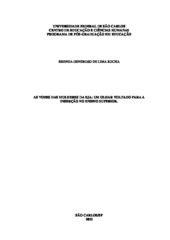| dc.contributor.author | Rocha, Brenda Generoso de Lima | |
| dc.date.accessioned | 2023-01-11T18:31:09Z | |
| dc.date.available | 2023-01-11T18:31:09Z | |
| dc.date.issued | 2022-10-31 | |
| dc.identifier.citation | ROCHA, Brenda Generoso de Lima. As vozes das mulheres da EJA: um olhar voltado para a inserção no ensino superior. 2022. Dissertação (Mestrado em Educação) – Universidade Federal de São Carlos, São Carlos, 2022. Disponível em: https://repositorio.ufscar.br/handle/ufscar/17207. | * |
| dc.identifier.uri | https://repositorio.ufscar.br/handle/ufscar/17207 | |
| dc.description.abstract | This master's research aimed to analyze the narratives of three women who graduated from EJA (Portuguese acronym for Youth and Adult Education) and what were the transforming elements and the excluding elements that influenced the insertion of these women in higher education, having Dialogical Learning (1997) as a theoretical-methodological foundation, based on some central authors such as Flecha (1997); Freire (1985; 1997; 2005; 2009; 2011; 2014), following the dual perspective described by Giddens (1991; 1996; 2003). This is a qualitative field research based on twelve narratives of three women who graduated from EJA, who have already concluded higher education in Pedagogy in Brazilian federal public institutions. Due to the Covid-19 pandemic, the narratives were virtually collected based on the Life Stories methodology guidelines (JOSSO, 2004) and analyzed based on the contributions of the Communicative Methodology (GÓMEZ et al, 2006). The narratives present excluding elements and transforming elements, both in the school trajectory and in the social environment of the three women with regard to influences in the their journey towards a higher education degree. As excluding elements, the data revealed the denial of the right of access to and permanence in school spaces, the presence of male chauvinism as a consequence of men's domination over women and the female role in the patriarchal and capitalist society in which we live. As transforming elements, the data put in evidence the instrumental dimensions, such as a gain in autonomy and critical thinking, highlighting the role of the progressive teacher (FREIRE, 2009), in addition to solidary relationships in building support networks for women. It is expected that those discussions contribute towards the role of this progressive teacher and solidary relationships in the fight against male chauvinism and ageism, helping with new public policies for this modality of education, which is marked by a historical context of exclusion and a current situation that still needs transforming instruments so that new EJA graduates are also included in the university environment, as a right. | eng |
| dc.description.sponsorship | Coordenação de Aperfeiçoamento de Pessoal de Nível Superior (CAPES) | por |
| dc.language.iso | por | por |
| dc.publisher | Universidade Federal de São Carlos | por |
| dc.rights | Attribution-NonCommercial-NoDerivs 3.0 Brazil | * |
| dc.rights.uri | http://creativecommons.org/licenses/by-nc-nd/3.0/br/ | * |
| dc.subject | Educação de Jovens e Adultos | por |
| dc.subject | Mulher | por |
| dc.subject | Egresso | por |
| dc.subject | Ensino superior | por |
| dc.subject | Youth and Adult Education | eng |
| dc.subject | High school graduate | eng |
| dc.subject | Women | eng |
| dc.subject | Higher education | eng |
| dc.title | As vozes das mulheres da EJA: um olhar voltado para a inserção no ensino superior | por |
| dc.title.alternative | EJA's women voices: a perspective towards higher education inclusion | eng |
| dc.type | Dissertação | por |
| dc.contributor.advisor1 | Braga, Fabiana Marini | |
| dc.contributor.advisor1Lattes | http://lattes.cnpq.br/1103496815216263 | por |
| dc.description.resumo | A presente pesquisa de mestrado teve como objetivos analisar narrativas de três mulheres egressas da EJA e quais foram os elementos transformadores e os elementos excludentes que influenciaram a inserção dessas mulheres no ensino superior, tendo como fundamento teórico-metodológico a Aprendizagem Dialógica (1997), principalmente, a partir de alguns autores centrais como Flecha (1997); Freire (1985; 1997; 2005; 2009; 2011; 2014), seguindo a perspectiva dual em Giddens (1991; 1996; 2003). Trata-se de uma pesquisa de campo qualitativa com base em doze narrativas de três mulheres egressas da EJA, que já concluíram o ensino superior no curso de Licenciatura em Pedagogia em instituições públicas federais. Por conta da pandemia da Covid-19, as narrativas foram coletadas virtualmente a partir das orientações da metodologia de Histórias de Vida (JOSSO, 2004) e analisadas com base nas contribuições da Metodologia Comunicativa (GÓMEZ et al, 2006). As narrativas apresentam elementos excludentes e elementos transformadores tanto na trajetória escolar quanto no entorno social das três mulheres no que se refere às influências na busca pelo ensino superior. Como elementos excludentes, os dados revelaram o direito negado de acesso e permanência aos espaços escolares, a presença do machismo como representante da dominação do homem sobre a mulher e o papel feminino na sociedade patriarcal e capitalista em que vivemos. Já como elementos transformadores, os dados apresentaram a dimensão instrumental como ganho de autonomia e senso crítico, tendo como destaque o papel do professor progressista (FREIRE, 2009), além das relações solidárias na construção de redes de apoio às mulheres. Espera-se que as discussões possam contribuir no que se refere ao papel deste professor progressista e nas relações solidárias, na luta contra o machismo, edismo que auxilie novas políticas públicas para essa modalidade, que é marcada por um contexto histórico de exclusão e uma atualidade que ainda necessita de instrumentos transformadores para que novos egressos/as da EJA também sejam inclusos no ambiente universitário, como direito. | por |
| dc.publisher.initials | UFSCar | por |
| dc.publisher.program | Programa de Pós-Graduação em Educação - PPGE | por |
| dc.subject.cnpq | CIENCIAS HUMANAS::EDUCACAO | por |
| dc.description.sponsorshipId | CAPES: código de financiamento - 001 | por |
| dc.publisher.address | Câmpus São Carlos | por |
| dc.contributor.authorlattes | https://lattes.cnpq.br/2280806022154282 | por |


